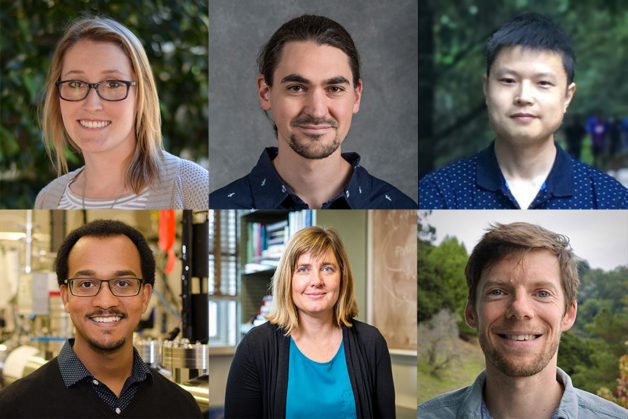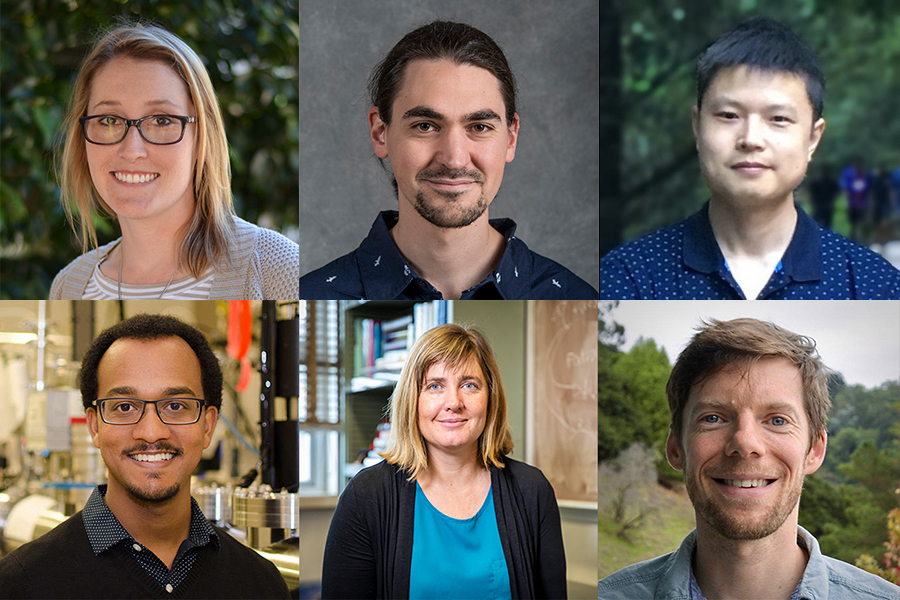
Top row: Berkeley Lab scientists Laura Lammers, Simon Roux, and Tong Zhou. Bottom row: Faculty scientists Kwabena Bediako, Heather Gray, and Trevor Keenan.
Three scientists at Lawrence Berkeley National Laboratory (Berkeley Lab) have been selected by the U.S. Department of Energy’s Office of Science to receive significant funding for research through its Early Career Research Program (ECRP). In addition, three faculty scientists with joint appointments at Berkeley Lab and UC Berkeley will receive ECRP funding through their UC Berkeley affiliations.
“The Department of Energy is proud to support funding that will sustain America’s scientific workforce, and create opportunities for our researchers to remain competitive on the world stage,” said DOE Under Secretary for Science Paul Dabbar. “By bolstering our commitment to the scientific community, we invest into our nation’s next generation of innovators.”
The program, now in its 11th year, is designed to bolster the nation’s scientific workforce by providing support to exceptional researchers during the crucial early career years, when many scientists do their most formative work. The three Berkeley Lab recipients are among 76 recipients selected this year, including 26 from DOE’s national laboratories.
The scientists are each expected to receive grants of up to $2.5 million over five years to cover salary and research expenses.
This year’s Berkeley Lab awardees and their projects are listed below:
Laura Lammers is a faculty scientist in the Energy Geosciences Division, and an assistant professor in UC Berkeley’s department of Environmental Science, Policy, and Management. Her research focuses on identifying and understanding the physiochemical processes at the interface of mineral surfaces and complex aqueous fluids that govern natural geochemical processes. Applications include: contaminant sequestration, crystallization, and selective element recovery.
Her award is for her work on “Illuminating the Molecular Pathways of Trace Element Incorporation During Crystal Growth.” The project will identify the impact of impurities on mineral formation to inform novel crystallization methods that are critical to advancing energy and water technologies.
Simon Roux is a research scientist in the Joint Genome Institute, a DOE Office of Science user facility located at Berkeley Lab. He studies viral diversity in the environment, and the impacts of virus-host interactions on individual microbial and ecosystem processes. His work includes the analysis of viral diversity and virus-host interactions in microbial communities, and the development of new computational and experimental tools to characterize newly discovered viruses.
His award is for his work in “Characterizing Virus-Driven Alterations of Microbial Metabolism in Model Soil Ecosystems.” The project will use a combination of experimental approaches and large-scale data analysis to better characterize how viruses infect soil microbes and influence how soil ecosystems function. Specifically, the project will attempt to identify the mechanisms used by soil viruses to take over and reprogram their host cell during infection, evaluate how these infection dynamics change with soil location and condition, and measure how these viral infections eventually alter global element and nutrient cycling.
Tong Zhou is a research scientist in the Accelerator Technology and Applied Physics Division. His research focuses on ultrafast laser technologies, including laser systems based on optical fibers and solid-state materials, and their applications – especially on high repetition-rate laser-plasma accelerators.
His award is for his research on a multi-kilohertz laser-plasma accelerator driven by a spectrally combined fiber laser. Laser-plasma accelerators (LPAs) could greatly reduce the size and cost of particle accelerators, and fiber lasers are very promising to drive future high-repetition-rate LPAs. However, the optical pulses produced by existing fiber lasers are too long. This research will address the gap between the limited pulse durations of existing fiber lasers and the LPA application needs, and will demonstrate a fiber-laser-based, high-repetition-rate LPA that will use machine learning to implement feedback control. Technologies developed in this research can enable many applications using high-repetition-rate electron beams, including those in science and medicine, and with further development can enable the path to future laser-driven particle colliders.
Additionally, faculty scientists Kwabena Bediako, Chemical Sciences Division; Heather Gray, Physics Division; and Trevor Keenan, Climate and Ecosystem Sciences Division, received Early Career awards through their UC Berkeley affiliations:
- Bediako, an assistant professor in chemistry, received the award for his research, “Manipulating Interfacial Reactivity With Atomically Layered Heterostructures.”
- Gray, an assistant professor in physics, received the award for work in “Probing the Flavor Dependence of Higgs Couplings With Charm Tagging.”
- And Keenan, an assistant professor in environmental science, policy, and management, received the award for research on “Extreme Drought, Heat, and Wildfire Impacts on Coastal Water Relations.”
Also among this year’s awardees is Wenhao Sun, an assistant professor at the University of Michigan who recently worked in the Materials Sciences Division as a staff scientist, for his work, “Temperature-Time-Transformation Diagrams for Predictive Solid-State Ceramic Synthesis.” During his time at Berkeley Lab he also worked as a postdoctoral researcher with senior faculty scientist Gerbrand Ceder in the Materials Sciences Division, and in 2019 won first place in the Berkeley Lab SLAM for Early Career Scientists and Postdocs.
A complete list of this year’s ECRP awardees is available on the Office of Science website.
###
Founded in 1931 on the belief that the biggest scientific challenges are best addressed by teams, Lawrence Berkeley National Laboratory and its scientists have been recognized with 13 Nobel Prizes. Today, Berkeley Lab researchers develop sustainable energy and environmental solutions, create useful new materials, advance the frontiers of computing, and probe the mysteries of life, matter, and the universe. Scientists from around the world rely on the Lab’s facilities for their own discovery science. Berkeley Lab is a multiprogram national laboratory, managed by the University of California for the U.S. Department of Energy’s Office of Science.
DOE’s Office of Science is the single largest supporter of basic research in the physical sciences in the United States, and is working to address some of the most pressing challenges of our time. For more information, please visit energy.gov/science.
